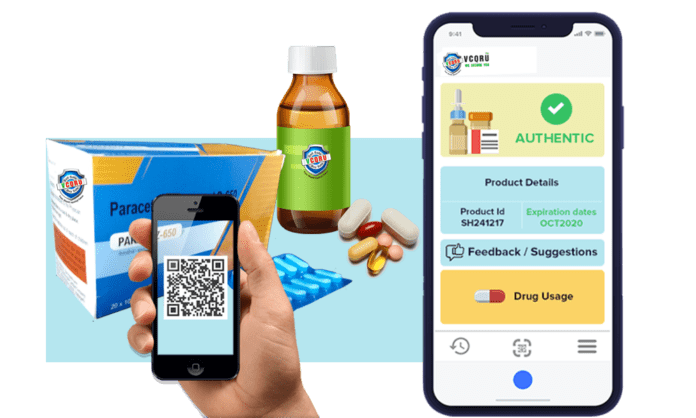
While traceability is becoming a regulatory requirement across many industries, there is a need to move from traditional models to comprehensive copy-proof protection. Today’s supply chain is impacted by the clonability of barcodes and QR Codes despite the track and trace solutions in place.
On 21 August, PackPlus organized a webinar to explore opportunities in non-cloneable QR codes to safeguard the supply chain to the last-mile, to enhance consumer trust in brands. PS Easwaran of Deloitte India moderated the webinar.
Impact of credible traceability on supply chain
“Not a new topic, industries are already working on traceability for quite some time. However, they have now been able to solve many critical problems,” Dilip Saha of Robert Bosch said. He cited examples of fake products reducing brand value and revenues and the compromise of their ‘brand promise.’
Saha is an advocate of blockchain as a system to bring multiple organizations on a single platform to build traceability. Nevertheless, even with this approach, the question remains on the credibility of traceability. “It does not solve one of the critical problems — physical to digital mapping,” he admits.
“The digital supply chain creates a trust economy between all the parties — producers who hold the brand promise and the consumer who are looking for authenticity and trust from the regulatory point of view.”
On bringing in cash flow through blockchain, he said, “The blockchain technology enables organizations to transact value. But we need to walk a mile still to enable the framework and the regulatory framework to let the transaction happen.”
Non-cloneable technology for pharma
Due to Covid-19, traceability has gained prominence as the entire supply chain is disrupted, and there are more chances of counterfeits, according to Mohit Agarwal of Janssen (J&J) Pharmaceutical. “Anything which is cloneable or digital is subject to counterfeits, which leads to an urgent need for non-cloneable technologies.”
He added that the country has many new entrants in the pharmaceutical space, which will change the entire ecosystem, including the government’s public procurement policies. “Adding a non-cloneable feature will offer more authenticity, and as a result, credible traceability will give better outcomes in the overall state of things.”
Agro and food processing
According to Venkat Maroju of SourceTrace, certifying, getting a label, putting it on the product, and documenting certain practices is also called traceability. He feels that physical traceability in India is at a very nascent stage. Speaking of non-cloneable technologies in the food and agro market, he said, “Non-cloneable traceability can apply to the seed industry which has spurious seed issues and where the damage to farmers is immense.” He also suggested that a parallel or counterfeit food and agriculture market is not feasible due to the low margins and high competition.
Technology to avoid pitfalls
In the Covid-19 crisis, when we have so many constraints, social distancing norms, and restrictions on physical mobilization, hands-on market investigation becomes difficult. This brings up the demand for automated and robust security features without changing existing production lines. The need is for easy to implement and minimal adoption changes, which are cost-effective.
According to Ajay Raorane of Domino Printech India, Domino is working with partners to fulfill market needs. “Our quest lies in simpler, reliable, scalable, and most suitable solutions for mass packaging. We are on a mission to transform normal printing into a non-cloneable print while emphasizing credible traceability. The end consumer must verify the product with fewer hassles and a zero false acceptance ratio. A genuine product cannot be termed as counterfeit because of technological limitations.”
Priyank Vasa of Unick Fix-a-Form & Printers also mentioned the easy manipulation of bar codes and QR codes. As a converter, he demanded technological solutions to fill this gap. “We look at non-cloneable technology with primary expectations, including ease of printing and processing, tolerance to minor printing defects, flexibility in terms of customer expectations and credibility.”
Speed, accuracy, and authenticity of data
Speaking of challenges that manufacturing businesses face today, Dinesh Pilgaokar of Barcode India, said, “There are two main challenges — the authenticity of the data and authenticity of the product. Which means that they are either fighting counterfeiting or they are trying to protect their brand.”
He stated that organizations are doing everything to protect their brand and invoke trust, which, according to him, is not enough, “Companies are ensuring the authenticity of the data to some extent but are not ensuring the authenticity of the product. The authentication still lies within the walls of the organization.”
He calls data an invaluable asset for any organization. “With authentic data, you can make informed business decisions. The non-cloneable technologies combined with authentic data can be extremely beneficial for credible traceability. In addition, organizations adopting automation are just getting better because the room for manual intervention is almost zero.”
Ashish Anand, Technical director, Linksmart Technologies, stated that there is a continuous quest for something simpler, mass acceptable, and exercisable. Being a non-cloneable traceability solution provider, he said. “We aim to convert every print on the earth, whether it is digital or inkjet, so that it can be linked to non-cloneable technologies.”
Key takeaways
The webinar concluded with main takeaways — leverage technology to become more robust to defend against disruptions of businesses. The marketplace trends, including ePharmacy, consumer safety, health and hygiene, and manufacturers looking at exports driven by compliance to regulations, are demanding these solutions.
Non-cloneable technologies can be implemented quickly from what is existing on the table regardless of what the naysayers insist. The technology generates a wealth of information beyond just traceability. Credible data can help understand customer behavior, demand, supply chain performance, and drive an organization’s digital journey.






